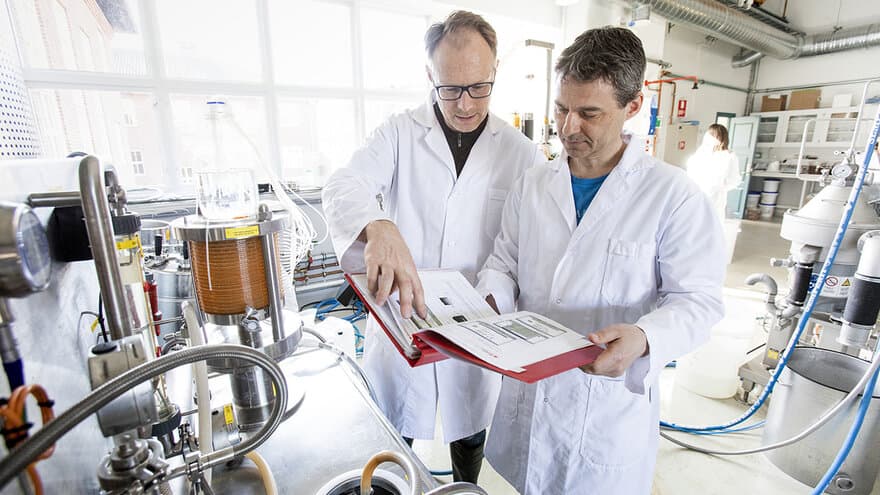About the lab pilot biorefinery
Activities
The biorefinery is a facility for processing and refining the vast majority of biomasses.
Among other things, the Lab pilot for biorefining can process residual raw materials and by-products that are not foodstuffs on a 30-50 litre scale.
You will find infrastructure and equipment for research, innovation and teaching at our NMBU premises. We can also take on assignments for external partners and other customers.
Equipment
Available equipment at the biorefining laboratory includes:
- Milling equipment (ball mill, cutter mill)
- 30 litre fermenter
- Filtration equipment (bag filters and depth filters)
- Ultrafiltration/nanofiltration
- Spray dryer
- High dry matter reactors/hydrolysis tanks (for the enzyme processing of raw material with low water content)
- 50 litre hydrolysis tanks (temperature regulated)
- Vacuum evaporator
- Mixers
- Freeze drier (lab scale)
- Separator and decanter
- Scrape heat exchanger
Research centres and projects
Biofuels and industrial biotechnology
Two major centres that are important regarding the work taking place at the biorefinery in the future are:
NMBU is the host institution and SINTEF is the project manager. In addition, Bio4Fuels has a large number of user partners from Norwegian industry and management and from several other European countries. Bio4Fuels conducts research, innovation and education in the production of advanced biofuels and other biorefining products.
Bio4Fuels is funded by the Research Council of Norway and its user and research partners.
2) SFI Industrial Biotechnology: a research centre that works to move Norway towards a more prominent international position within the field of industrial biotechnology. It aims to increase the competitiveness of the Norwegian biotech industry and promote innovations that have great national and international market potential, e.g. from the sustainable use of raw materials, forestry residues, biomass from macroalgae and by-products from the meat, fishery and aquaculture industries.
Industrial biotechnology involves the industrial application of modern biotechnology methods, enzymes and microorganisms for the production of a diverse range of goods, including chemicals, pharmaceutical products, food products and feed ingredients, detergents, textiles, energy and materials.
Sustainable food production and feed resources
Furthermore, the biorefinery is one of several processing halls associated with Food Pilot Plant Norway, Norway’s only food research factory.
It is also central to several major research projects within the field of food science.
One of these is the research centre called Foods of Norway. Through the use of new technology, its main goal is to develop sustainable feed resources from underutilised biomass such as forests, macroalgae (seaweed and kelp) and roughage.
Based on local feed resources, the centre will also develop robust livestock through high feed efficiency in order to increase the production of milk, meat and fish.
Contact
